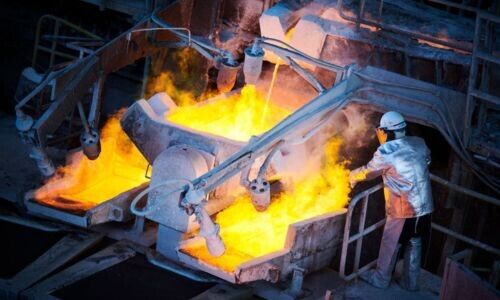Glencore Rides the Gold Wave
Global mining giant Glencore is renowned for its copper, zinc, and coal operations. However, last year, the company also capitalized on surging gold prices. Frustrated with the stock market, CEO Gary Nagle is now weighing the possibility of abandoning the London Stock Exchange.
On Wednesday, Glencore presented its 2024 annual results to financial analysts in Baar close to Zug in Switzerland. The key figures, which are crucial in the mining sector, were in line with expectations due to falling commodity prices: Adjusted EBITDA amounted to 14.4 billion dollars, 16 percent less than in 2023. This generated a free cash flow of $4.8 billion (2023: $5.2 billion).
Operating income stood at minus $1.6 billion, compared to $4.3 billion in the previous year. However, this is not considered a loss in Baar. «It was a very strong year for Glencore», CEO Gary Nagle said.
«What makes sense is cash generation»
«There are some accounting adjustments which get you to a net profit or a net loss. Some of those who do not fully understand of how accounting works in the mining industry always seem to report on net income. That makes no sense, as we all know.» He added: «What really makes sense is cash generation and adjusted EBITDA.»
In recent years, Glencore has primarily benefited from a boom in coal. However, its price dropped by more than 30 percent last year. Metals, particularly copper and zinc, partially offset this development: While the metals division contributed 42.2 percent to adjusted EBITDA in 2023, it was nearly 58 percent in 2024.
Gold as a By-Oroduct
According to CEO Nagle, price trends in coal and metals are often countercyclical. With significant activities in both areas, Glencore is therefore well-positioned for most market situations.
The additional cash flows Glencore was able to generate due to a 23 percent increase in gold prices last year were described by the CEO as «helpful». Gold is extracted as a by-product in the mining of other metals and coal.
«We have a good gold operation»
Although gold is not a core business for Glencore (the company owns no gold mines except for a 70 percent stake in the Altyntau-Kokshetau mine in Kazakhstan), Glencore produced 738,000 ounces of gold last year (equivalent to 21 tonnes). The company sold a total of 2.4 million ounces, or approximately 68,000 kilograms, at a current market value of about 200 million dollars.
«Gold isn't core to us», commented Nagle. However, «Gold is very flavor of the day, prices are very strong and we have a good gold operation.»
Billions For Shareholders
Glencore plans to distribute about half of its 2024 cash flow to shareholders. This includes a dividend of $1.2 billion (0.10 dollars per share) and a share buyback worth 1 billion dollars, which is expected to be completed by the time the half-year results are presented in August.
Despite these prospects, the stock market reacted negatively. By midday, Glencore shares had fallen by 7 percent.
Struggles With Stock Market
Nagle hinted that he believes the stock markets are underestimating Glencore’s potential. In recent years, the company has refined its mining portfolio to a world-class level. As a result, Glencore holds decades’ worth of relatively cost-effective reserves in coal and copper.
The CEO explained Glencore’s prevailing philosophy of «Supply Discipline»: In the interest of profitability, the company extracts raw materials conservatively when prices are not favorable. In particular, he sees significant growth potential for copper prices due to universal demand driven by global electrification (artificial intelligence, electric mobility, etc.).
«Stealth Going Private»
As long as markets assess Glencore’s prospects more pessimistically than the company itself, it plans to continue aggressive share buyback programs. In recent years, Glencore has already repurchased ten percent of its own shares through this approach.
The Glencore CEO compared this to «taking private our company by stealth» and called it «a terrific form of M&A while it trades at a discount».
Goodbye, London Stock Exchange?
Glencore is also dissatisfied with its listing on the London Stock Exchange. «We are in active consideration in moving our listing from London», said the CEO. The most likely option is a listing in the United States, where nearly 50 percent of the company’s institutional investors are already based. «You see some of the valuation multiples and the money available there…», Nagle said, while emphasizing that all options are being considered.
The mining giant is not worried about the current tariff debate. Due to the geographic depth and breadth of its mining assets, the company could even benefit from interesting arbitrage opportunities.




























